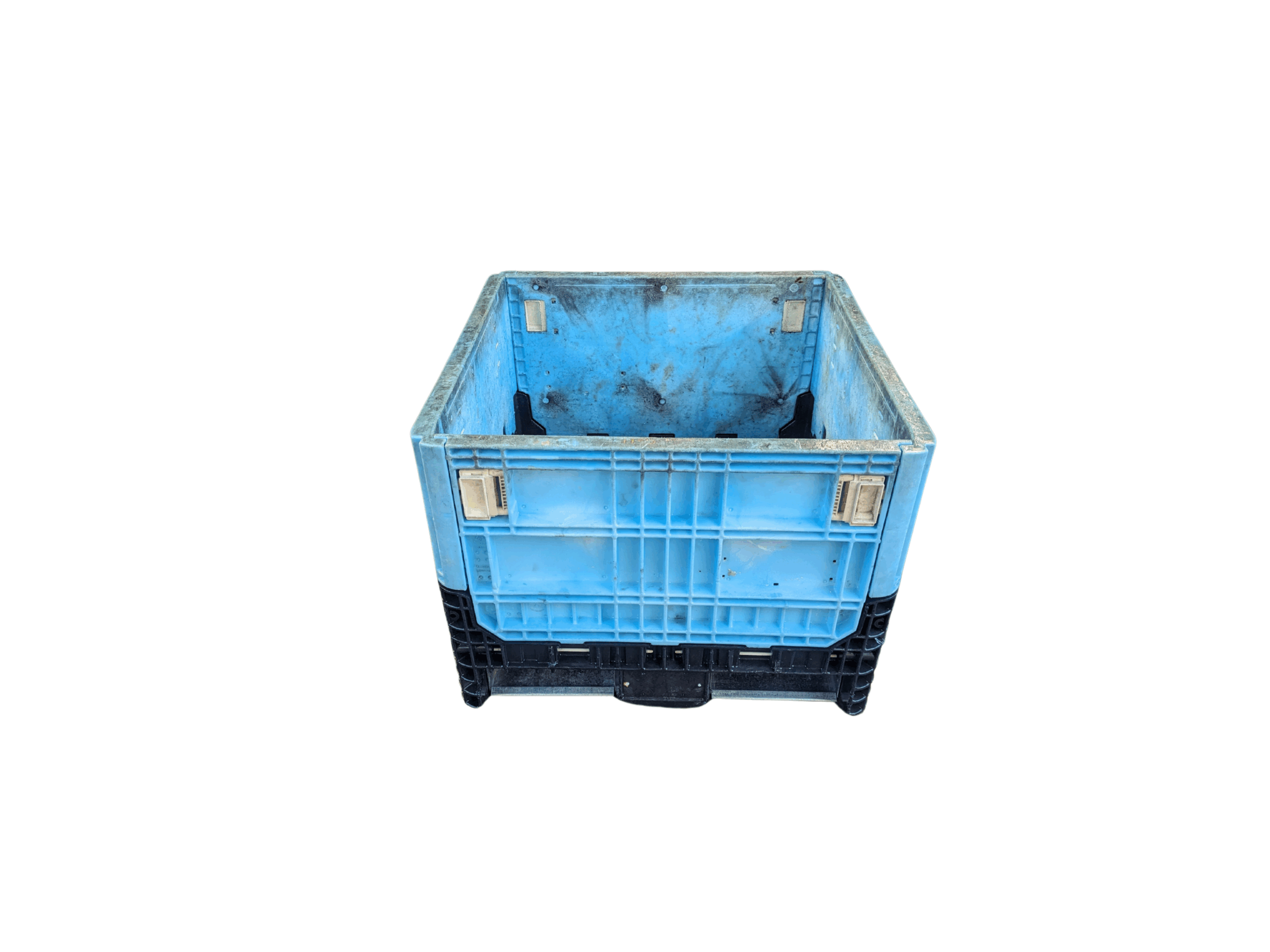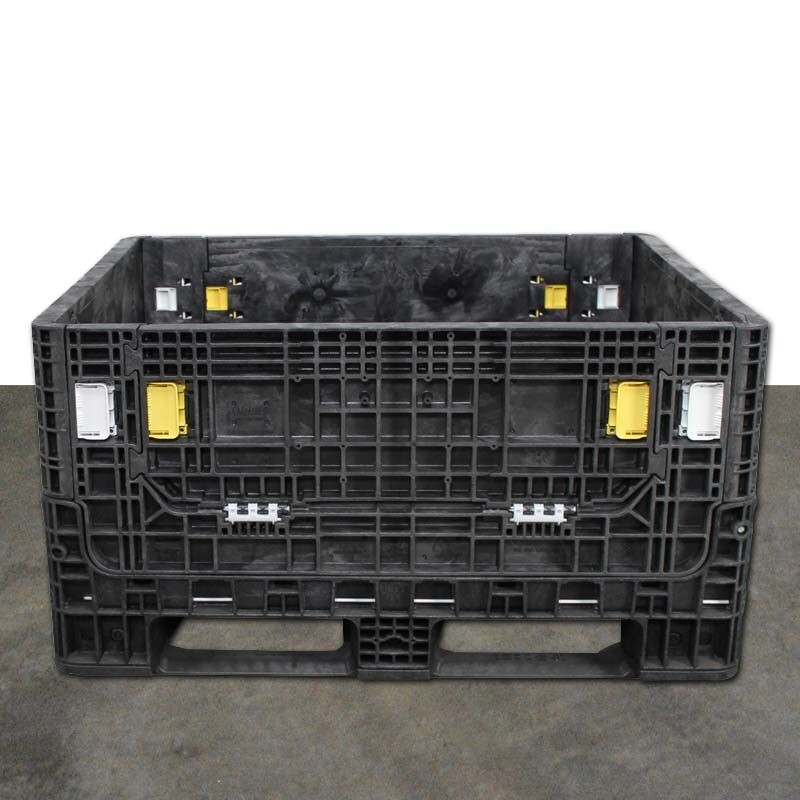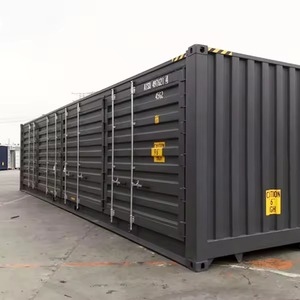Discover durable solutions with used plastic containers for organized storage
Wiki Article
Why Bulk Containers Are Important for Lasting and Economical Transportation
Bulk containers play a vital duty in contemporary logistics. They promote the reliable activity of big quantities of goods, thus optimizing transportation processes. This technique not only lowers expenses but additionally reduces ecological influence via reduced exhausts and waste generation. As industries seek even more lasting methods, the fostering of mass containers is becoming increasingly substantial. What ramifications does this shift hold for future logistics and supply chain management?
The Benefits of Utilizing Mass Containers in Logistics
Mass containers reinvent logistics by boosting efficiency and sustainability. These containers enable for the transportation of large amounts of products in a single journey, markedly lowering the number of trips called for. This not only improves operations yet likewise minimizes labor expenses related to handling, loading, and unloading. In addition, mass containers are made to optimize space use within transportation vehicles, guaranteeing that even more items can be delivered at the same time.The standardization of mass containers also simplifies the logistics process. With consistent measurements, they can be quickly stacked and stored, bring about improved warehouse management. Additionally, mass containers typically feature resilient products that protect materials from damage during transit, therefore lowering product loss and boosting total integrity. As an outcome, organizations can experience improved supply chain performance, ultimately resulting in boosted profitability and client contentment. This mix of factors makes bulk containers a crucial possession in modern-day logistics.
Ecological Influence: Decreasing Waste and Carbon Impact
As markets increasingly focus on sustainability, the adoption of bulk containers has actually become a key strategy for reducing waste and lowering carbon footprints. These containers decrease using product packaging products, such as boxes and plastic, consequently significantly decreasing overall waste generation. By settling deliveries, bulk containers enhance transport performance, enabling even more products to be transferred per journey. This decrease in journeys straight correlates with reduced greenhouse gas emissions, adding to a smaller carbon impact.Bulk containers can often be reused or recycled, even more reducing ecological effect. The toughness of these containers guarantees they can withstand multiple transport cycles, reducing the need for single-use choices. refurbished bulk containers. By improving logistics and promoting effective source usage, mass containers not only support sustainable practices but additionally urge sectors to line up with international ecological goals. Ultimately, their application mirrors a commitment to environmental stewardship and liable source monitoring
Cost Financial Savings: How Bulk Containers Lower Transportation Expenditures
While several business look for ways to enhance their profits, using mass containers offers a significant possibility for decreasing transportation costs. Bulk containers make the most of the volume of goods moved, permitting services to ship bigger amounts at once. This efficiency lowers the number of journeys called for, directly reducing gas costs and reducing labor expenditures associated with loading and dumping.Additionally, mass containers commonly include structured designs that maximize space utilization within transportation vehicles. This indicates less vacant spaces, resulting in much more effective usage of readily available capacity. In addition, the toughness of mass containers can lower the danger of item damages throughout transit, making certain and minimizing losses that even more items arrive undamaged.
Enhancing Supply Chain Performance With Mass Storage Space Solutions
Bulk storage space solutions play an essential function in enhancing supply chain performance by enhancing inventory monitoring. By consolidating items into less, bigger containers, services can greatly reduce taking care of costs connected with constant transfers and handling. This streamlined technique permits for much better tracking and administration of inventory, inevitably causing enhanced operational efficiency.Structured Inventory Management
Reliable stock monitoring is important for maximizing supply chain procedures, especially when organizations embrace bulk storage options. These services allow services to keep higher stock degrees while lessening the frequency of replenishment. By consolidating products into mass containers, companies can improve their supply procedures, decreasing the complexity connected with tracking numerous smaller sized packages. This approach helps with accurate stock matters and enhances forecasting precision, allowing for more educated decision-making. Additionally, mass storage space services simplify storage facility organization, making it much easier to locate and access items when needed. Therefore, organizations can achieve a much more reliable stock turnover rate, ultimately enhancing total supply chain performance and lowering the likelihood of stockouts or overstock situations.
Lowered Handling Costs
The implementation of bulk storage space solutions not only improves inventory management however likewise considerably minimizes handling expenses throughout the supply chain. By consolidating products right into mass containers, business reduce the demand for regular handling and transfer between various storage space and transportation devices. This method reduces down on labor costs connected with loading, unloading, and relocating smaller packages. Additionally, bulk storage space minimizes the regularity of shipments, resulting in reduced transportation prices and lowered gas usage. Therefore, services can enhance their logistics operations, enabling an extra reliable allowance of resources. Ultimately, minimized taking care of expenses add to enhanced general supply chain efficiency, fostering an atmosphere that sustains both sustainability and economic practicality.
Adaptability of Bulk Containers Throughout Numerous Industries
Although numerous markets have distinct requirements for transport and storage space, mass containers have actually emerged as a flexible remedy that satisfies a variety of needs. These containers, varying from huge bins to specialized storage tanks, can fit diverse products, consisting of powders, liquids, and granules. In the farming industry, bulk containers help with the transport of grains and fertilizers, while the food and beverage sector uses them for components and ended up products. The chemical sector depends on bulk containers for safely transferring harmful products, ensuring conformity with security guidelines. Furthermore, construction firms profit from bulk containers for transporting accumulations and various other materials. Their adaptability encompasses different modes of transport, including ships, trains, and vehicles, improving logistical performance. This versatility not only simplifies operations across different industries but additionally promotes sustainability by reducing packaging waste and enhancing space en route. Therefore, mass containers play an essential duty in modern supply chain visit the site monitoring.Future Trends in Mass Container Usage and Sustainability
The future of bulk container usage is progressively shaped by cutting-edge materials advancement that enhances sustainability. Additionally, automation in logistics assures to simplify procedures, lowering waste and enhancing efficiency. Accepting circular economy methods will even more change how bulk containers are designed, utilized, and reused, promoting a much more sustainable transportation landscape.Innovative Products Advancement
As industries increasingly focus on sustainability, innovative materials development wholesale containers becomes a significant consider boosting environmentally friendly transportation options. Suppliers and researchers are discovering eco-friendly plastics, recycled compounds, and light-weight steels to reduce ecological effect. These materials not only minimize waste but additionally boost fuel performance find out this here by lowering the overall weight of containers. Furthermore, advancements in clever materials, which can adjust to varying problems, enhance the resilience and functionality of bulk containers. The combination of these innovative materials straightens with circular economic climate principles, promoting reuse and recycling. As the demand for sustainable practices grows, the development of such materials will certainly play a crucial function in forming the future of bulk container use in logistics and transportation.Automation in Logistics
Considerable developments in automation are poised to change logistics and the use of mass containers, boosting sustainability in transportation. Automated systems, consisting of drones and autonomous automobiles, are simplifying the motion of bulk containers, reducing the dependence on typical fuel-powered transport. These technologies maximize transmitting and packing processes, minimizing vacant miles and enhancing fuel performance. Furthermore, automated inventory management systems boost tracking and monitoring of mass containers, ensuring far better resource allocation and reduced waste. The assimilation of the Web of Things (IoT) permits real-time information analysis, enabling aggressive decision-making that straightens with sustainability goals. As automation remains to evolve, it is expected to drive further developments in mass container use, ultimately sustaining more lasting logistics methods and decreasing the ecological influence of transport.Circular Economic Situation Practices
Advancements in automation are establishing the phase for an extra incorporated strategy to circular economic climate practices in the domain name of mass container usage. As industries increasingly accept sustainability, mass containers are being made for durability and reusability. This change not only reduces waste but likewise improves source effectiveness. Business are embracing methods such as closed-loop systems, where made use of containers are accumulated, refurbished, and reestablished into the supply chain. In addition, clever innovations track container life process, promoting much better monitoring and reducing environmental influence. The collaboration between suppliers, logistics companies, and end-users is crucial in establishing requirements for sustainable container use. used bulk containers. Future patterns suggest a growing focus on products that are naturally degradable and recyclable, more reinforcing the round economic climate's principles in mass transport
Often Asked Inquiries
What Materials Are Bulk Containers Generally Made From?
Mass containers are typically constructed from durable materials such as high-density polyethylene, aluminum, cardboard, and steel. These products offer convenience, security, and strength, making them ideal for transporting various items in different sectors efficiently.How Do I Pick the Right Size Mass Container?
Choosing the right dimension bulk container includes examining the quantity of materials to be transferred, taking into consideration taking care of tools compatibility, and evaluating storage space requirements. Correct size assurances effectiveness in transport and minimizes waste throughout delivery.Are Mass Containers Reusable or Recyclable?
Bulk containers are usually recyclable, created for numerous journeys, improving sustainability. Many can likewise be reused, depending on the materials utilized. Choosing recyclable choices better sustains ecological article goals and minimizes waste in transport methods.What Safety Laws Relate To Bulk Container Transport?
Safety guidelines for mass container transportation consist of conformity with the Division of Transport guidelines, proper labeling of harmful products, architectural stability evaluations, and adherence to weight restrictions to ensure safe handling and prevent mishaps throughout transit.Just How Can Services Transition to Utilizing Mass Containers Properly?
Companies can change to bulk containers by assessing present logistics, training staff on handling, spending in suitable equipment, enhancing supply monitoring, and teaming up with vendors to ensure compatibility and effectiveness throughout the supply chain.
As markets progressively prioritize sustainability, the fostering of bulk containers has arised as a key approach for minimizing waste and lowering carbon impacts. By consolidating products right into mass containers, business can streamline their inventory processes, lowering the complexity connected with tracking multiple smaller plans. As markets increasingly prioritize sustainability, innovative products development in mass containers emerges as a substantial aspect in improving environmentally friendly transport options. Automated systems, consisting of drones and autonomous lorries, are streamlining the motion of bulk containers, lowering the reliance on standard fuel-powered transport. In addition, automated supply management systems improve monitoring and surveillance of mass containers, making sure much better resource allowance and minimized waste.
Report this wiki page